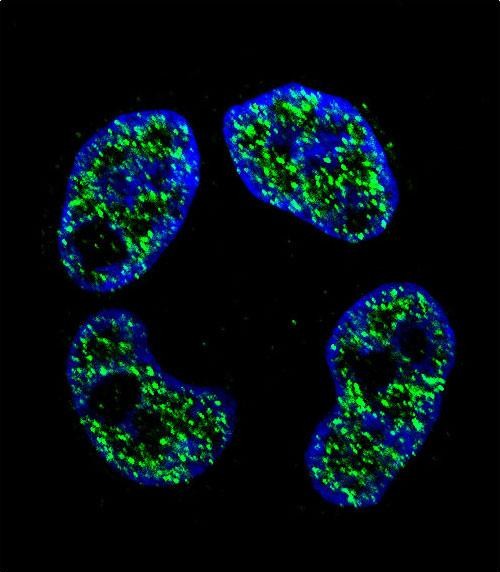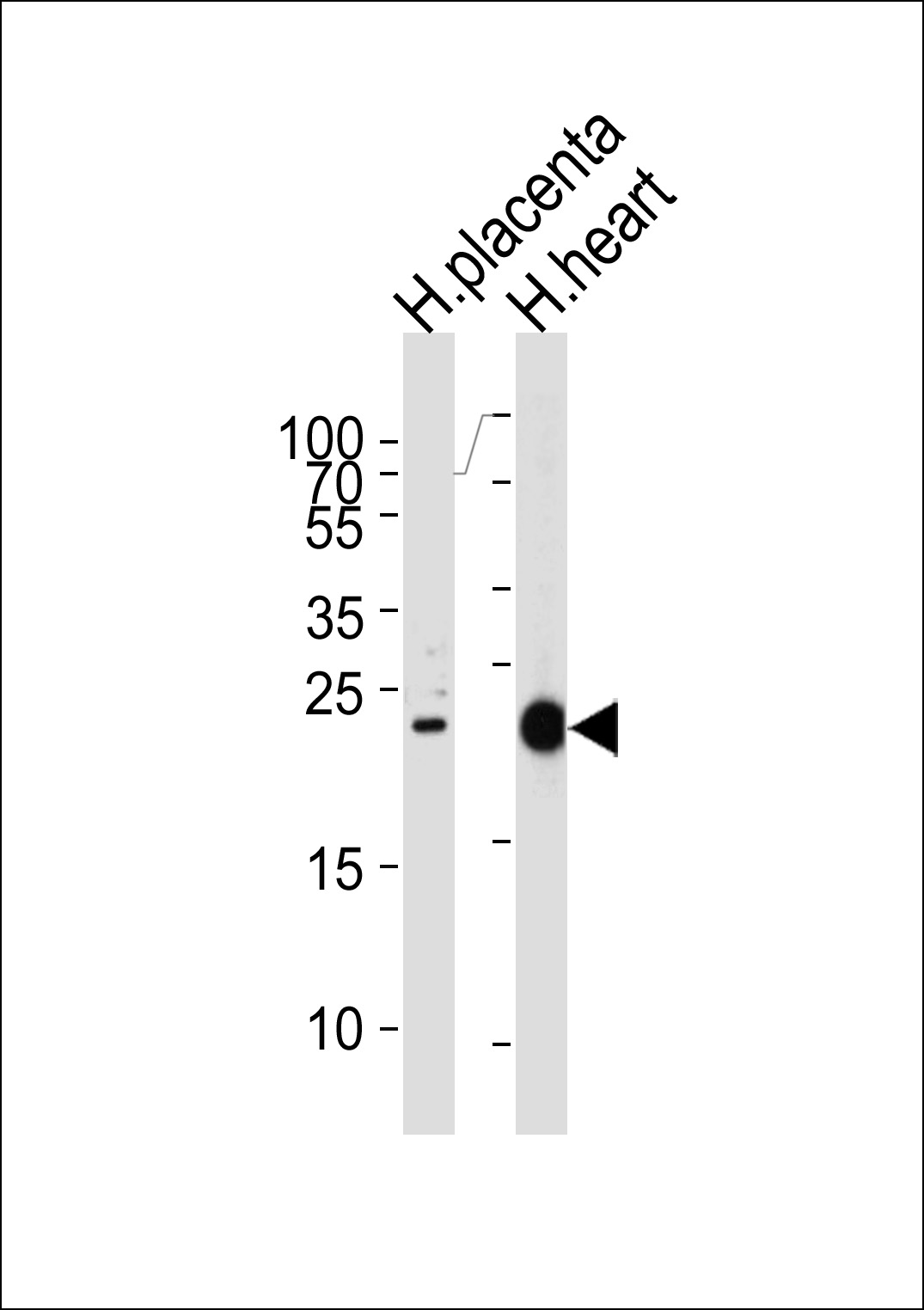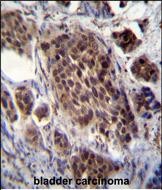FRAT2 Antibody (C-term)
Affinity Purified Rabbit Polyclonal Antibody (Pab)
- SPECIFICATION
- CITATIONS
- PROTOCOLS
- BACKGROUND

Application
| WB, IF, IHC-P, E |
|---|---|
| Primary Accession | O75474 |
| Other Accession | NP_036215.1 |
| Reactivity | Human |
| Host | Rabbit |
| Clonality | Polyclonal |
| Isotype | Rabbit IgG |
| Calculated MW | 24051 Da |
| Antigen Region | 203-230 aa |
| Gene ID | 23401 |
|---|---|
| Other Names | GSK-3-binding protein FRAT2, Frequently rearranged in advanced T-cell lymphomas 2, FRAT-2, FRAT2 |
| Target/Specificity | This FRAT2 antibody is generated from rabbits immunized with a KLH conjugated synthetic peptide between 203-230 amino acids from the C-terminal region of human FRAT2. |
| Dilution | WB~~1:1000 IF~~1:10~50 IHC-P~~1:10~50 E~~Use at an assay dependent concentration. |
| Format | Purified polyclonal antibody supplied in PBS with 0.09% (W/V) sodium azide. This antibody is purified through a protein A column, followed by peptide affinity purification. |
| Storage | Maintain refrigerated at 2-8°C for up to 2 weeks. For long term storage store at -20°C in small aliquots to prevent freeze-thaw cycles. |
| Precautions | FRAT2 Antibody (C-term) is for research use only and not for use in diagnostic or therapeutic procedures. |
| Name | FRAT2 |
|---|---|
| Function | Positively regulates the Wnt signaling pathway by stabilizing beta-catenin through the association with GSK-3. |

Thousands of laboratories across the world have published research that depended on the performance of antibodies from Abcepta to advance their research. Check out links to articles that cite our products in major peer-reviewed journals, organized by research category.
info@abcepta.com, and receive a free "I Love Antibodies" mug.
Provided below are standard protocols that you may find useful for product applications.
Background
The protein encoded by this intronless gene belongs to the GSK-3-binding protein family. Studies show that this protein plays a role as a positive regulator of the WNT signaling pathway. It may be upregulated in tumor progression.
References
Lee, D.Y., et al. Menopause 17(5):1064-1070(2010)
Liu, G.P., et al. Neurobiol. Aging 29(9):1348-1358(2008)
Stoothoff, W.H., et al. J. Biol. Chem. 280(1):270-276(2005)
Deloukas, P., et al. Nature 429(6990):375-381(2004)
Freemantle, S.J., et al. Gene 291 (1-2), 17-27 (2002) :
If you have used an Abcepta product and would like to share how it has performed, please click on the "Submit Review" button and provide the requested information. Our staff will examine and post your review and contact you if needed.
If you have any additional inquiries please email technical services at tech@abcepta.com.













 Foundational characteristics of cancer include proliferation, angiogenesis, migration, evasion of apoptosis, and cellular immortality. Find key markers for these cellular processes and antibodies to detect them.
Foundational characteristics of cancer include proliferation, angiogenesis, migration, evasion of apoptosis, and cellular immortality. Find key markers for these cellular processes and antibodies to detect them. The SUMOplot™ Analysis Program predicts and scores sumoylation sites in your protein. SUMOylation is a post-translational modification involved in various cellular processes, such as nuclear-cytosolic transport, transcriptional regulation, apoptosis, protein stability, response to stress, and progression through the cell cycle.
The SUMOplot™ Analysis Program predicts and scores sumoylation sites in your protein. SUMOylation is a post-translational modification involved in various cellular processes, such as nuclear-cytosolic transport, transcriptional regulation, apoptosis, protein stability, response to stress, and progression through the cell cycle. The Autophagy Receptor Motif Plotter predicts and scores autophagy receptor binding sites in your protein. Identifying proteins connected to this pathway is critical to understanding the role of autophagy in physiological as well as pathological processes such as development, differentiation, neurodegenerative diseases, stress, infection, and cancer.
The Autophagy Receptor Motif Plotter predicts and scores autophagy receptor binding sites in your protein. Identifying proteins connected to this pathway is critical to understanding the role of autophagy in physiological as well as pathological processes such as development, differentiation, neurodegenerative diseases, stress, infection, and cancer.




